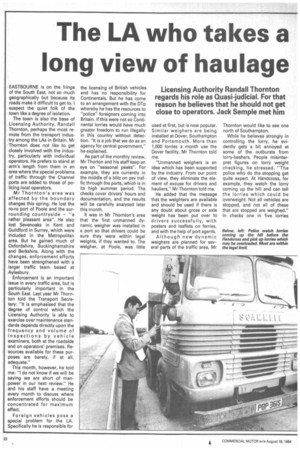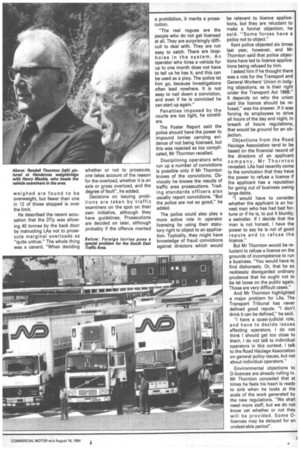The LA who takes a long view of haulage
Page 24

Page 25

If you've noticed an error in this article please click here to report it so we can fix it.
Licensing Authority Randall Thornton regards his role as Quasi-judicial. For that reason he believes that he should not get close to operators. Jack Semple met him
EASTBOURNE is on the fringe of the South East, not so much geographically but because its roads make it difficult to get to. I suspect the quiet folk of the town like a degree of isolation.
The town is also the base of Licensing Authority, Randall Thornton, perhaps the most remote from the transport industry among the LAs in Britain. Mr Thornton does not like to get closely involved with the industry, particularly with individual operators. He prefers to stand at arm's length from them in an area where the special problems of traffic through the Channel ports are added to those of policing local operators.
Mr Thornton's area was affected by the boundary changes this spring. He lost the ro-ro port of Poole and the surrounding countryside — "a rather pleasant area". He also lost Sevenoaks in Kent and Guildford in Surrey, which were included in the Metropolitan area. But he gained much of Oxfordshire, Buckinghamshire and Berkshire. Along with the changes, enforcement efforts have been strengthened with a larger traffic team based at Aylesbury.
Enforcement is an important issue in every traffic area, but is particularly important in the South East. Last year Mr Thornton told the Transport Secretary: "It is emphasised that the degree of control which the Licensing Authority is able to exercise over maintenance standards depends directly upon the frequency and volume of inspections by vehicle examiners, both at the roadside and on operators' premises. Resources available for these purposes are barely, if at all, adequate."
This month, however, he told me: "I do not know if we will be saying we are short of manpower in our next review." He and his staff have a meeting every month to discuss where enforcement efforts should be concentrated for maximum effect. the licensing of British vehicles and has no responsibility for Continentals. But he has come to an arrangement with the DTp whereby he has the resources to "police" foreigners coming into Britain. If this were not so Continental lorries would have much greater freedom to run illegally in this country without detection. "It is a job that we do as an agency for central government," he explained.
As part of the monthly review, Mr Thorton and his staff keep an eye on "seasonal peaks". For example, they are currently in the middle of a blitz on psv traffic through the ports, which is in its high summer period. The checks cover drivers' hours and documentation, and the results will be carefully analysed later this month.
It was in Mr Thornton's area that the first unmanned dynamic weigher was installed in a port so that drivers could be sure they were within legal weights, if they wanted to. The weigher, at Poole, was little used at first, but is now popular. Similar weighers are being installed at Dover, Southampton and Portsmouth. More than 1,000 lorries a month use the Dover facility, Mr Thornton told me.
"Unmanned weighers is an idea which has been supported by the industry. From our point of view, they eliminate the element of excuse for drivers and hauliers," Mr Thornton told me.
He added that the message that the weighters are available and should be used if there is any doubt about gross or axle weight has been put over to drivers successfully, with posters and leaflets on ferries, and with the help of port agents.
Although new dynamic weighers are planned for several parts of the traffic area, Mr Thornton would like to see one north of Southampton.
While he believes strongly in controlling the lorry, he evidently gets a bit annoyed at some of the outbursts from lorry-bashers. People misinterpret figures on lorry weight checking, he stressed. "The police who do the stopping get quite expert. At Handcross, for example, they watch the lorry coming up the hill and can tell the lorries which could be overweight. Not all vehicles are stopped, and not all of these that are stopped are weighed." In checks one in five lorries weighed are found to be overweight, but fewer than one in 12 of those stopped is over the limit.
He described the recent accusation that the DTp was allowing 40 tonnes by the back door by instructing LAs not to prosecute marginal overloads as "quite untrue." The whole thing was a canard. "When deciding whether or not to prosecute, one takes account of the reason for the overload, whether it is an axle or gross overload, and the degree of fault", he added.
Decisions on issuing probitions are taken by traffic examiners on the spot on their own initiative, although they have guidelines. Prosecutions are decided on later, although probably if the offence merited a prohibition, it merits a prosecution.
"The real rogues are the people who do not get licensed at all. They are surprisingly difficult to deal with. They are not easy to catch. There are loopholes in the system. An operator who hires a vehicle for up to one month does not have to tell us he has it, and this can be used as a ploy. The police let him go, because investigations often lead nowhere. It is not easy to nail down a conviction, and even if he is convicted he can start up again."
Penalties imposed by the courts are too light, he considers.
The Foster Report said the police should have the power to impound lorries carrying evidence of not being licensed, but this was rejected as too complicated, Mr Thornton recalled.
Disciplining operators who run up a number of convictions is possible only if Mr Thornton knows of the convictions. Obviously he knows the results of traffic area prosecutions. Trading standards officers also usually report convictions. "But the police are not so good," he added.
The police could also play a more active role in operator licensing by using their statutory right to object to an application. Typically, they might have knowledge of fraud convictions against directors which would be relevent to licence applications, but they are reluctant to make a formal objection, he said. "Some forces have a policy not to object."
Kent police objected six times last year, however, and Mr Thornton said that police objections have led to licence applications being refused by him.
I asked him if he thought there was a role for the Transport and General Workers' Union in lodg ing objections, as is their right under the Transport Act 1968."
It depends on why the union said the licence should be refused," was his answer. If it was forcing its employees to drive all hours of the day and night, in breach of hours regulations, that would be ground for an objection.
Objections from the Road Haulage Association tend to be based on the financial record of the directors of an applicant company, Mr Thornton revealed. LAs had recently come to the conclusion that they have the power to refuse a licence if the applicant has a reputation for going out of business owing large debts.
"I would have to consider whether the applicant is an ho nest man who has had bad for tune or if he is, to put it bluntly, a swindler. If I decide that the man is not honest, I have the power to say he is not of good repute and to refuse the licence."
But Mr Thornton would be reluctant to refuse a licence on the grounds of incompetence to run a business. "You would have to find dishonesty. Or, that he so recklessly disregarded ordinary prudence that he ought not to be let loose on the public again. Those are very difficult cases."
And Mr Thornton highlighted a major problem for LAs. The Transport Tribunal has never defined good repute. "I don't think it can be defined," he said.
"I have a quasi-judicial role, and have to decide issues affecting operators. I do not think I should get too close to them. I do not talk to individual operators in this context. I talk to the Road Haulage Association on general policy issues, but not about individual operators."
Environmental objections to 0-licences are already rolling in. Mr Thornton conceded that at times he feels his heart is ready to sink when he looks at the scale of the work generated by the new regulations. "We shall need more staff, but we do not know yet whether or not they will be provided. Some 0licences may be delayed for an undesirable period".








































































